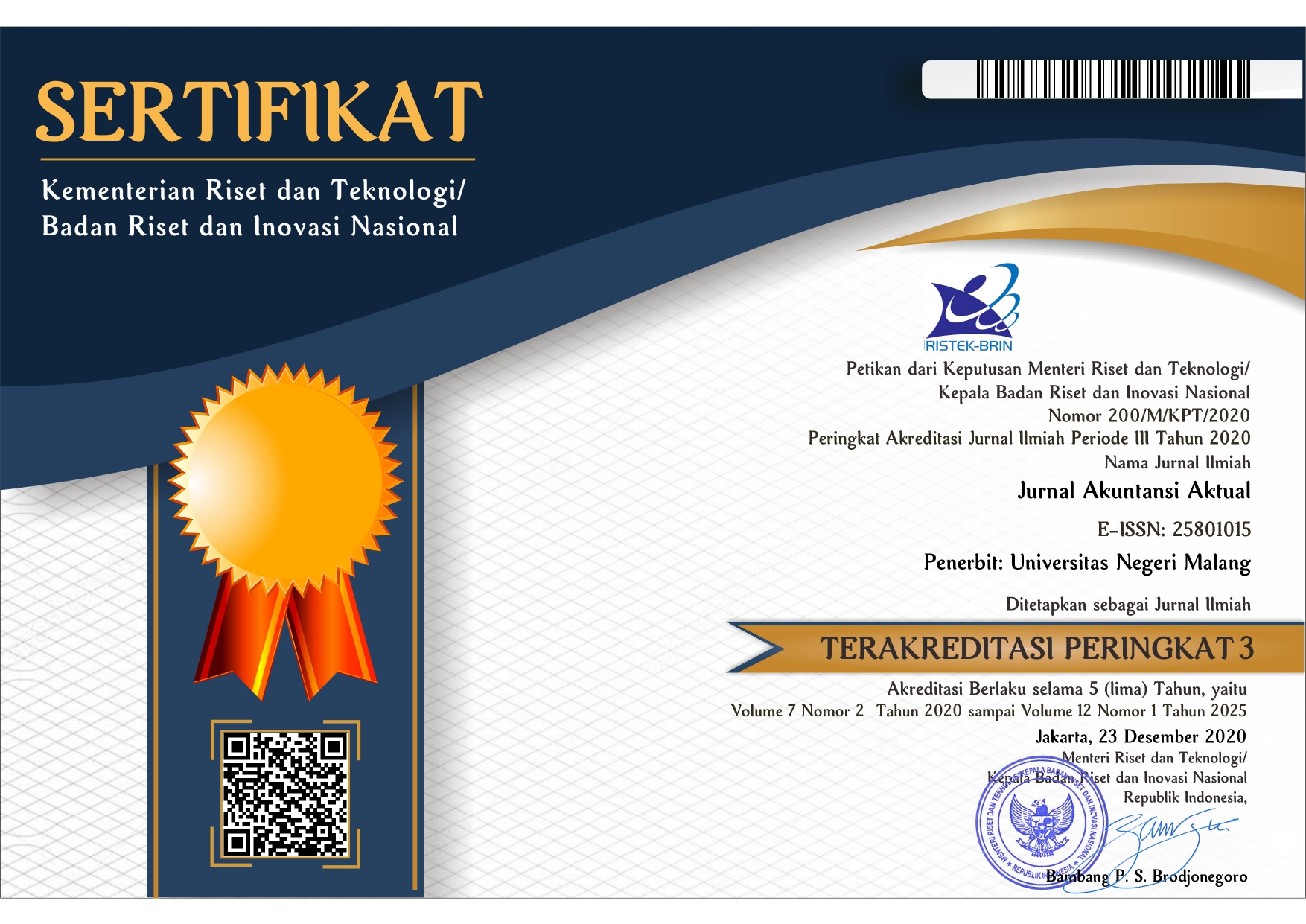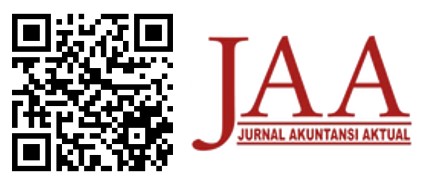Apakah insentif keuangan dan persepsi keseriusan berpengaruh terhadap keputusan aparatur sipil negara melakukan whistleblowing?
Abstract
Abstrak: Penelitian ini bertujuan untuk menguji pengaruh persepsi keseriusan dan insentif keuangan terhadap keputusan aparatur sipil negara (ASN) melakukan whistleblowing kepada pihak eksternal. Kedua variabel independent yang diuji di dalam penelitian ini, yaitu persepsi keseriusan dan insentif keuangan, didasarkan pada teori motivasi ekstrinsik-intrinsik. Penelitian ini menggunakan metode experimental between-subject sehingga ada dua jenis kuesioner disebarkan ke ASN di tiga institusi yang berbeda. Responden hanya diperbolehkan mengisi salah satu kuesioner. Pemilihan responden dilakukan dengan menggunakan metode convenience sampling. Hasil uji ancova memperlihatkan bahwa keputusan aparatur sipil negara dalam melaporkan pelanggaran dipengaruhi oleh seberapa serius pelanggaran tersebut (persepsi keseriusan). Dampak insentif keuangan terhadap intensi whistleblowing tidak signifkan. Interaksi antara persepsi keseriuan dan insentif keuangan mengindikasikan bahwa terlepas dari keberadaan imbalan moneter, semakin serius suatu pelanggaran, semakin besar pula intensi ASN melaporkan pelanggaran. Studi ini berkontribusi pada literatur akademis dan pembuat kebijakan. Penelitian ini memperdalam literatur mengenai pendeteksian kecurangan dan memberikan bukti kepada pembuat kebijakan mengenai dampak persepsi keseriusan dan insentif keuangan terhadap intensi aparatur sipil negara untuk melaporkan kecurangan.
Keywords
Full Text:
PDFReferences
Anderfuhren-Biget, S., Varone, F., Giauque, D., & Ritz, A. (2010). Motivating Employees of the Public Sector: Does Public Service Motivation Matter? International Public Management Journal, 13(3), 213-246. doi:10.1080/10967494.2010.503783
Andon, P., Free, C., Jidin, R., Monroe, G. S., & Turner, M. J. (2018). The Impact of Financial Incentives and Perceptions of Seriousness on Whistleblowing Intention. Journal of Business Ethics, 151(1), 165-178. doi:10.1007/s10551-016-3215-6
Andon, P., Free, C., Jidin, R., Monroe, G. S., & Turner, M. J. (2018). The Impact of Financial Incentives and Perceptions of Seriousness on Whistleblowing Intention. Journal of Business Ethics, 151(1), 165-178.
Ayers, S., & Kaplan, S. E. (2005). Wrongdoing by Consultants: An Examination of Employees’ Reporting Intentions. Journal of Business Ethics, 57(2), 121-137. doi:10.1007/s10551-004-4600-0
Buelens, M., & Van Den Broeck, B. (2007). An Analysis of Differences in Work Motivation between Public and Private Sector Organizations. Public Administration Review, 67(1), 65-74. doi:10.1111/ j.1540-6210.2006.00697.x
Charness, G., Gneezy, U., & Kuhn, M. A. (2012). Experimental methods: Between-subject and within-subject design. Journal of Economic Behavior & Organization, 81(1), 1-8. doi:10.1016/j.jebo.2011.08.009
Curtis, M. B. (2006). Are Audit-related Ethical Decisions Dependent Upon Mood?. Journal of Business Ethics, 68(2), 191-209. doi:10.1007/s10551-006-9066-9
Curtis, M. B., & Taylor, E. Z. (2009). Whistleblowing in Public Accounting: Influence of Identity Disclosure, Situational Context, and Personal Characteristics. Accounting and the Public Interest, 9(1), 191-220. doi:10.2308/api.2009.9.1.191
Deci, E. L., & Ryan, R. M. (1985). Intrinsic Motivation and Self-Determination in Human Behavior. New York: Plenum.
Dobbs, I. M., & Miller, A. D. (2009). Experimental Evidence on Financial Incentives, Information, and Decision Making. The British Accounting Review, 41(2), 71-89. doi:10.1016/j.bar.2008.10.002
Feldman, Y., & Lobel , O. (2010). The Incentives Matrix: The Comparative Effectiveness of Rewards, Liabilities, Duties and Protections for Reporting Illegality. Texas Law Review, 87. doi:10.2139/ ssrn.1415663
Komisi Pemberantasan Korupsi. (2017). Laporan Tahunan KPK 2017. Jakarta: Komisi Pemberantasan Korupsi.
Komisi Pemberantasan Korupsi. (2018, Desember 20). Capaian dan Kinerja KPK di Tahun 2018. Retrieved from www.kpk.go.id: https://www.kpk.go.id/id/berita/siaran-pers/717-capaian-dan- kinerja-kpk-di-tahun-2018
Kruglanski, A. W. (1978). Endogenous Attribution and Intrinsic Motivation. In M. R. Lepper, & D. Greene, The Hidden Cost of Reward: New Perspectives on the Psychology of Human Motivation (pp. 85-107). New Jersey: Lawrence Eribaum Associates, Inc.
Lei, G., & Brink, A. G. (2017). Whistleblowing studies in accounting research: A review of experimental studies on the determinants of whistleblowing. Journal of Accounting Literature, 38, 1-13.
Near, J. P., & Miceli, M. P. (1985). Organizational Dissidence: The Case of Whistle-Blowing. Journal of Business Ethics, 4(1), 1-16.
Near, J. P., & Miceli, M. P. (1995). Effective Whistle-Blowing. The Academy of Management Review, 20(3), 679-708.
Pope, K. R., & Lee, C.-C. (2012). Could the Dodd–Frank Wall Street Reform and Consumer Protection Act of 2010 be Helpful in Reforming Corporate America? An Investigation on Financial Bounties and Whistle-Blowing Behaviors in the Private Sector. Journal of Business Ethics, 112(4), 597-607. doi:10.1007/s10551-012-1560-7
Republik Indonesia. (2018). Peraturan Pemerintah No 43 Tahun Tata Cara Pelaksanaan Peran Serta Masyarakat dan Pemberian Penghargaan Dalam Pencegahan dan Pemberantasan Tindak Pidana Korupsi.
Ryan, R. M., & Deci, E. L. (2000). Intrinsic and Extrinsic Motivations: Classic Definitions and New Directions. Contemporary Educational Psychology, 25(1), 54-67. doi:10.1006/ceps.1999.1020
Stikeleather, B. R. (2016). When do Employers Benefit from Offering Workers a Financial Reward for Reporting Internal Misconduct? Accounting, Organizations and Society, 52, 1-14.
Taylor, E. Z., & Curtis, M. B. (2010). An Examination of the Layers of Workplace Influences in Ethical Judgments: Whistleblowing Likelihood and Perseverance in Public Accounting. Journal of Business Ethics, 93(1), 21-37. doi: 10.1007/s10551-009-0179-9
Taylor, E. Z., & Curtis, M. B. (2013). Whistleblowing in Audit Firms: Organizational Response and Power Distance. Behavioral Research in Accounting, 25(2), 21-43. doi: 10.2308/bria-50415
Weibel, A., Rost, K., & Osterloh, M. (2010). Pay for Performance in the Public Sector - Benefits and (Hidden) Costs. Journal of Public Administration Research and Theory: J-PART, 20(2), 387-
Retrieved from http://www.jstor.org/stable/40732516
Winardi, R. D. (2013). The Influence of Individual and Situational Factors on Lower-Level Civil Servants’ Whistleblowing Intention in Indonesia. Journal of Indonesian Economy and Business,
(3), 361-376. Retrieved from https://search.proquest.com/docview/1548716199?account id=108784
DOI: http://dx.doi.org/10.17977/um004v7i12020p1
Refbacks
- There are currently no refbacks.

This work is licensed under a Creative Commons Attribution-ShareAlike 4.0 International License.
Jurnal Akuntansi Aktual is indexed by:















